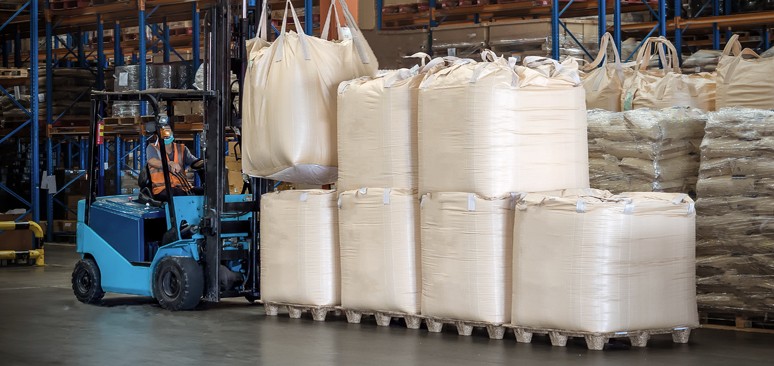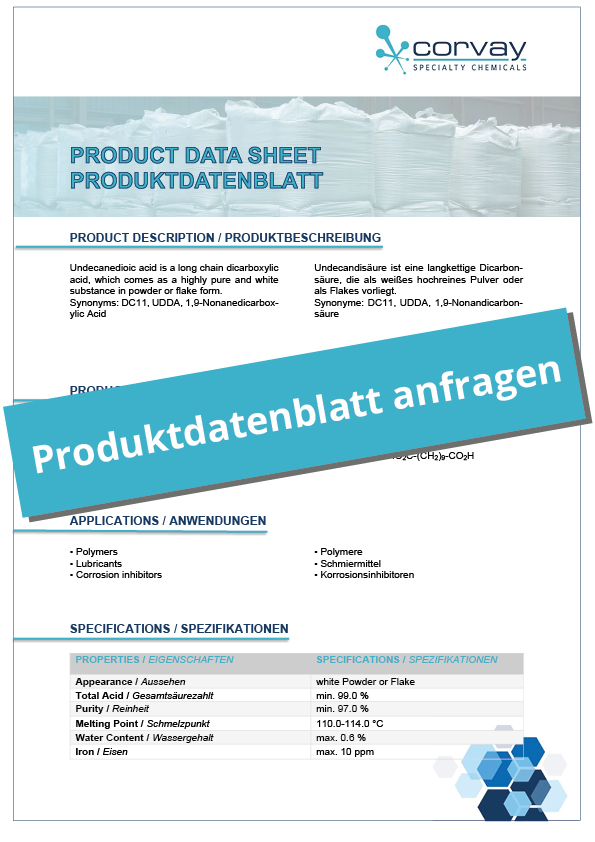
Undecanedioic acid (UDDA, DC11)
UNDECANDICADE
PRODUCT DESCRIPTION:
Undecanedioic acid is a long-chain dicarboxylic acid that is available as a white, high-purity powder or flakes.
Undecanedioic acid, also known as DC11 or UDDA, is a dicarboxylic acid with the chemical formula C11H20O4. It belongs to the family of aliphatic dicarboxylic acids, which contain two terminal bonded carboxylic acid groups (-COOH).
Undecanedioic acid consists of a linear carbon skeleton with 11 carbon atoms. The carbon chain gives the acid flexibility and hydrophobic properties.
UDDA is produced by the oxidation of long-chain alkanes through microbial fermentation.
Undecanedioic acid is a white, crystalline solid with a melting point that is lower than that of the chemically related dodecanedioic acid. It is only slightly soluble in water, but dissolves easily in organic solvents such as ethanol and diethyl ether. Corvay has its own REACH registration from UDDA and works with reliable manufacturers.
Undecanedioic acid has some similarities to dodecanedioic acid in terms of properties and applications. However, due to its shorter and odd number of carbon atoms in the chain, it may have slightly different properties and uses.
Corvay supplies UDDA for various applications in different industries. Below are some of the common applications of DC11:
Lubricant:
Undecanedioic acid and its derivatives are used in the production of synthetic lubricants. They can be reacted with alcohols to form esters, which are characterized by excellent lubricating properties, thermal stability and low volatility. These lubricants are used in the automotive, industrial and aerospace sectors.
Corrosion inhibitors:
Undecanedioic acid is used as an anti-corrosion agent in various industries, e.g. in the oil and gas industry, metal processing and water treatment. It forms a protective film on metal surfaces and thus prevents corrosion.
Polymers and coatings:
Undecanedioic acid can be used as a building block for the production of polyesters and polyamides. It can be polymerized with various monomers to form tailor-made properties. These polymers are used in coatings, adhesives and engineering plastics.
Chemical intermediates:
Undecanedioic acid serves as a chemical intermediate for the synthesis of various compounds, including pharmaceuticals, agrochemicals and specialty chemicals. It can be subjected to various chemical reactions to obtain products with specific functional groups and properties.
Body care products:
Undecanedioic acid and its derivatives are used in the manufacture of personal care products such as shampoos, conditioners, skin creams and cosmetics. They can act as emollients, moisturizers and conditioning agents to achieve the desired effect on skin and hair.
Adhesives and sealants:
Undecanedioic acid can be used as a curing agent in the production of adhesives and sealants. It contributes to the cross-linking of polymers, which improves the adhesion, strength and chemical resistance of the end products.
CHEMICAL REGULATIONS:
APPLICATION:
Corvay supplies undecanedioic acid to various industries with different applications:
PACKAGING:
SHIPPING:
STORAGE & SHELF LIFE
Store in a cool, dark place. If stored properly, the shelf life is at least two years.
DISCLAIMER
This information and all technical and other advice is based on the current knowledge and experience of Corvay Specialty Chemicals GmbH, Hannover, Germany. Corvay Specialty Chemicals GmbH assumes no liability for this information or advice, including the extent to which this information or advice may relate to intellectual property rights of third parties. Corvay Specialty Chemicals GmbH reserves the right to make changes to the information or advice at any time without prior or subsequent notice. Corvay Specialty Chemicals GmbH disclaims all representations and warranties, express or implied, and assumes no liability for the merchantability of the product or its fitness for any particular purpose, even if Corvay Specialty Chemicals GmbH is aware of such purpose or any other purpose. Corvay Specialty Chemicals GmbH shall not be liable for consequential, indirect or incidental damages, including lost profits of any kind. It is the sole responsibility of the customer to ensure that all products are inspected and tested by qualified experts.

